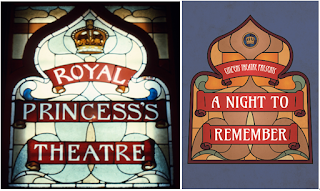A bit of 1918 style entertainment! The Citizen's history of variety
Our upcoming production
A Night To Remember will take audiences back in time to our building’s
origins as the Royal Princess’s Theatre for an evening of variety set on one
eventful night 100 years ago.
Variety and music hall are central to Scottish theatrical history. The genres shaped local audiences’ tastes for an accessible, engaging style of theatre that is fast-moving and funny as well as dramatically exciting. Here, we take a look back at where it all began:
 |
| Did you know our poster design for A Night To Remember (right) is based on a stain glass window from the Royal Princess's Theatre (left) which is in place in our dress circle bar. |
Music hall emerged in taverns and coffee houses across
Britain in the middle of the 19th century. It involved a mixture of
popular songs, comedy, dance and speciality acts. Performers entertained whilst
the audiences ate, drank and joined in with the singing. Music hall’s
popularity spread and it quickly became a favourite British pastime. The genre was regional in character and reactive to local tastes. In Scotland, for example, music hall performances often featured traditional Scots songs and music and the poetry of Robert Burns.
By the early 20th century music hall had started to fade away, and was gradually replaced with variety. Although similar in style to music hall, variety was more formal, audience participation was discouraged and new-purpose built theatres were created across Britain. The buildings often featured beautiful, ornate auditoriums with chandeliers, gold leaf decorations and red velvet seats. In Glasgow, venues such as the Empire Palace, Pavilion and Alhambra all became city centre landmarks, highlighting the importance of the genre for the city.
 |
| Exterior of the Royal Princess's Theatre. Image from Scottish Theatre Archive Ref: STA PH 483 |
The Royal Princess's variety programme featured names such as Neil Kenyon, Marie Kendall, Wal Langtry, Ella Retford and Florrie Forde. During the era, Scotland produced a wide range of home-grown variety stars including:
Tommy Lorne
 |
| Image from the Scottish Theatre Archive. Ref: STA H.h. 11 |
Tommy Lorne was a natural clown who starred in the Royal Princess's well-loved pantomimes. Born in the Cowcaddens area of Glasgow in 1890, some of his catch phrases even entered the local vocabulary - including "In the name of the wee man" and "Ah'll get ye, and if Ah don't get you the coos'll get ye!"
Grace Clark & Colin Murray
 |
| Image from the Scottish Theatre Archive. Ref: STA PYC |
This husband and wife team were better known as 'Mr and Mrs Glasgow'. Their comedy sketches portrayed Grace as the tough, tyrannical wife and Colin as the long-suffering husband. The duo starred in several Scottish Royal Variety performances and were awarded the British Empire Medial in 1982.
Will Fyffe
 |
| Image from the Scottish Theatre Archive. Ref: STA JLC PH 55 |
The Dundee-born entertainer appeared on stage, radio, television and film. He was so well liked that a variety theatre in Glasgow ran a 'Will Fyffe' competition, where hopefuls entered to sing the star's best known song 'I belong to Glasgow'. Disguising himself, Will entered for a bet and won second prize!
The popularity of variety across much of the UK began to diminish in the 1930s as audiences turned to the talking pictures. The Royal Princess's Theatre was converted to a cinema, and later a bingo hall. The Citizens Theatre Company then took over the building in 1945 and developed an innovative programme of new plays and classic texts. But this May we are going back to our roots with a bit of 1918 style entertainment, and we hope you'll join us at the Citizens Theatre for A Night To Remember!
A Night To Remember is a community production, with a company drawn from the Gorbals and across Glasgow. It runs from 23 - 26 May. Tickets available from £10.50. Book Now.
Part of the Southside Fringe Programme
Part of the Southside Fringe Programme
Sources:


Comments